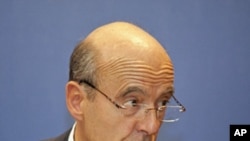The governments of the eight major economies that form the G8 have reaffirmed their commitment to help Arab and North African countries that are transitioning to democracy. Following a meeting Tuesday on the sidelines of the U.N. General Assembly, France’s foreign minister said $80 billion has been committed to five countries for the next two years.
French Foreign Minister Alain Juppé said what is known as the Deauville Partnership, because it was established at a meeting in the French city last spring, is not just about financial assistance to nascent democracies. He says it is about forming a global partnership that will have complementary political and economic components that are keys to sustainable peace and develpment.
“Of course, we are talking mostly about consolidation of rule of law; we are talking about also programs to help train judges, journalists; also programs to help election processes, the partnership will develop and will pursue the dialogue that it has started with the civil society," said Alain Juppé.
The group of major economies known as the G8 is comprised of France, Germany, Italy, Japan, Britain, Canada, the United States and Russia. The five countries that will be the beneficiaries of the Deauville Partnership are Tunisia, Egypt, Morocco, Jordan and the most recent member, Libya.
The $80 billion in financing includes $38 billion in multilateral assistance that was committed at the partnership’s last meeting by international financial institutions such as the World Bank and International Monetary Fund, as well as some bilateral contributions.
The political component of the partnership will focus on helping these countries as they build their democratic institutions. The economic dimension will promote broad-based and sustainable economic and financial growth, particularly through encouraging expanded trade and investment.
The Arab ministers agreed that their countries face major challenges, particularly in providing enough good jobs for their millions of young citizens, who in many cases were the catalyst for reforms and revolution and now expect results. The partnership plan will help these governments develop education and vocational training programs to help tackle illiteracy and lower unemployment.
Egypt’s Foreign Minister Mohamed Kamel Amr said the Deauville plan must be implemented immediately and be driven by the needs of the people.
“What is happening now in our countries is something exceptional which needs exceptional way of thinking - thinking out of the box - and exceptional measures to deal with it," said Amr. "Time [is] of the essence; our people have very high hopes and they need to see results on the ground.”
He added that through the Deauville Partnership, along with other measures, these new governments can fulfill the aspirations of their people.
G8 Commits $80 Billion to Arab Spring Democracy




